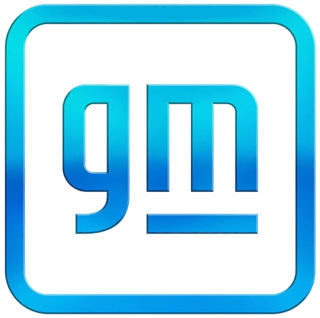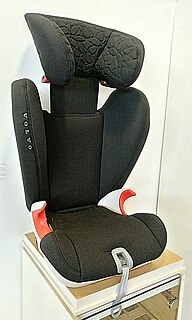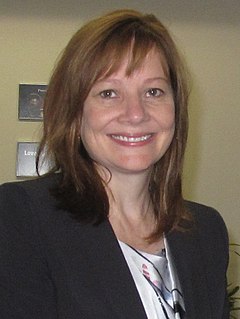Related Research Articles

General Motors Company (GM) is an American multinational corporation headquartered in Detroit that designs, manufactures, markets, and distributes vehicles and vehicle parts, and sells financial services, with global headquarters in Detroit's Renaissance Center. It was founded by William C. Durant on September 16, 1908, as a holding company, and the present entity was established in 2009 after its restructuring. The company is the largest American automobile manufacturer and one of the world's largest automobile manufacturers.

Hummer is a brand of trucks and SUVs, first marketed in 1992 when AM General began selling a civilian version of the M998 Humvee. In 1998, General Motors (GM) purchased the brand name from AM General and marketed three vehicles: the original Hummer H1, based on the military Humvee, as well as the new H2 and H3 models that were based on smaller, civilian-market GM platforms.

Chevrolet, colloquially referred to as Chevy and formally the Chevrolet Division of General Motors Company, is an American automobile division of the American manufacturer General Motors (GM). Louis Chevrolet and ousted General Motors founder William C. Durant started the company on November 3, 1911 as the Chevrolet Motor Car Company. Durant used the Chevrolet Motor Car Company to acquire a controlling stake in General Motors with a reverse merger occurring on May 2, 1918, and propelled himself back to the GM presidency. After Durant's second ousting in 1919, Alfred Sloan, with his maxim "a car for every purse and purpose", would pick the Chevrolet brand to become the volume leader in the General Motors family, selling mainstream vehicles to compete with Henry Ford's Model T in 1919 and overtaking Ford as the best-selling car in the United States by 1929.

A seat belt is a vehicle safety device designed to secure the driver or a passenger of a vehicle against harmful movement that may result during a collision or a sudden stop. A seat belt reduces the likelihood of death or serious injury in a traffic collision by reducing the force of secondary impacts with interior strike hazards, by keeping occupants positioned correctly for maximum effectiveness of the airbag and by preventing occupants being ejected from the vehicle in a crash or if the vehicle rolls over.

Automotive safety is the study and practice of design, construction, equipment and regulation to minimize the occurrence and consequences of traffic collisions involving motor vehicles. Road traffic safety more broadly includes roadway design.

OnStar Corporation is a subsidiary of General Motors that provides subscription-based communications, in-vehicle security, emergency services, hands-free calling, turn-by-turn navigation, and remote diagnostics systems throughout the United States, Canada, China, Mexico, Europe, Brazil, and Argentina.
The National Traffic and Motor Vehicle Safety Act was enacted in the United States in 1966 to empower the federal government to set and administer new safety standards for motor vehicles and road traffic safety. The Act was the first mandatory federal safety standards for motor vehicles. The Act created the National Highway Safety Bureau. The Act was one of a number of initiatives by the government in response to increasing number of cars and associated fatalities and injuries on the road following a period when the number of people killed on the road had increased 6-fold and the number of vehicles was up 11-fold since 1925. The reduction of the rate of death attributable to motor-vehicle crashes in the United States represents the successful public health response to a great technologic advance of the 20th century—the motorization of America.

A child safety seat, sometimes called a infant safety seat, child restraint system, child seat, baby seat, car seat, or a booster seat, is a seat designed specifically to protect children from injury or death during vehicle collisions. Most commonly these seats are purchased and installed by car owners, but car manufacturers may integrate them directly into their vehicle's design and generally are required to provide anchors and ensure seat belt compatibility. Many jurisdictions require children defined by age, weight, and/or height to use a government-approved child safety seat when riding in a vehicle. Child safety seats provide passive restraints and must be properly used to be effective. However, research indicates that many child safety restraints are often not installed or used properly. To tackle this negative trend, health officials and child safety experts produce child safety videos to teach proper car seat installation to parents and caregivers.

Willow Run Transmission was a General Motors factory in Ypsilanti Township, Michigan. Acquired by GM in 1953, it produced Hydramatic and other automatic transmissions for use in vehicles built by General Motors and other automakers. The factory first opened in 1941 as the Ford Willow Run facility, which built B-24 Liberator bombers during World War II, and its original building was designed by noted architect Albert Kahn.

The Center for Auto Safety is a Washington, D.C.-based 501(c)(3) consumer advocacy non-profit group focused on the United States automotive industry. Founded in 1970 by Consumers Union and Ralph Nader, the group focuses its efforts on enacting reform though public advocacy and pressuring the National Highway Traffic Safety Administration and automakers through litigation. For decades, it was led by Executive Director Clarence Ditlow, who died in late 2016 from cancer. Ditlow was widely admired in the auto safety community, although he also had detractors among auto manufacturers. The Center for Auto Safety is currently led by Executive Director Jason Levine.

The Chevrolet Volt is a plug-in hybrid manufactured by General Motors, also marketed in rebadged variants as the Holden Volt in Australia and New Zealand, Buick Velite 5 in China, and with a different fascia as the Vauxhall Ampera in the United Kingdom and as the Opel Ampera in the remainder of Europe. Volt production ended in February 2019.

The Chevrolet Traverse is a seven or eight seat full-size crossover SUV built by General Motors. It is built on the same platform as the GMC Acadia and Buick Enclave. It also shares the C1XX platform with the Cadillac XT6. It is the successor to the Chevrolet TrailBlazer SUV and Uplander minivan.

The Chevrolet Cruze is a compact car that has been made by the Chevrolet division of General Motors since 2008. The nameplate has been used previously in Japan, for a version of a subcompact hatchback car produced under a joint venture with Suzuki from 2001 to 2007, and was based on the Suzuki Ignis.
Safe Kids Worldwide is a global non-profit organization working to prevent childhood injury through research, community outreach, legislative advocacy and media awareness campaigns. Safe Kids Worldwide has over 400 coalitions in 49 states, and has partners in over 30 countries. The proclaimed mission of Safe Kids Worldwide is "protecting kids from unintentional injuries, the number one cause of death for children in the United States." It is a 501(c) organization.
Kidpower Teenpower Fullpower International, commonly shortened to Kidpower, is a 501(c)(3) nonprofit child safety organization teaching child protection and personal safety skills to adults and children to prevent bullying, abuse, abduction, and other violence. Kidpower was founded in 1989 in Santa Cruz, California, and has ten locations in the U.S. and 15 in other countries.

A five-point harness is a form of seat belt that contains five straps that are mounted to the car frame. It has been engineered for an increase of safety in the occurrence of an automobile accident. As a result, this form of seat belt has been mandated in the race car competition of NASCAR. This was an invention made mandatory to have due to the high velocities involved in the sport. Along with the design of the seat belt, helmet straps have been designed to increase the safety of the driver. This invention has also been used to secure infants and young children in child safety seats.

Takata Corporation was a Japanese automotive parts company. The company had production facilities on four continents, with its European headquarters located in Germany, where it also had nine production deaths and injuries. In 2013, a series of deaths and injuries associated with defective Takata airbag inflators in their Mexican subsidiary Tacata Airbags led Takata to initially recall 3.6 million cars equipped with such airbags. Further fatalities caused by the airbags have led the National Highway Traffic Safety Administration (NHTSA) to order an ongoing, US-wide recall of more than 42 million cars, the largest automotive recall in U.S. history. In June 2017, Takata filed for bankruptcy. It was acquired by Key Safety Systems.
The BeSeatSmart Program is a federal grant-based program supported by the Governor's Highway Safety Program, Vermont, and hosted by The Vermont Department of Health. BeSeatSmart provides child passenger safety seats, hands on help, advice, consultations, presentations, training, materials and support to residents of Vermont. BeSeatSmart provides best practice advice as given and sourced by the American Academy of Pediatrics (AAP) and the National Highway Traffic Safety Administration (NHTSA).
Herta Burbach Feely is a writer, editor, and child safety activist. She co-founded Safe Kids Worldwide.

Mary Teresa Barra is an American businesswoman who has been the chairman and CEO of General Motors Company since January 15, 2014. She is the first female CEO of a major automaker. On December 10, 2013, GM named her to succeed Dan Akerson as chief executive officer. Prior to being named CEO, Barra served as the executive vice president of Global Product Development, Purchasing, and Supply Chain at General Motors.
References
- 1 2 "The Foundation Center's RSS Feed of Japan Relief Grants". Foundation Center. Archived from the original on 26 April 2012. Retrieved 27 December 2011.
- ↑ "SK Buckle Up". Safe Kids USA. Retrieved 24 February 2008.
- ↑ "Safe Kids USA Donates 500,000th Child Safety Seat". WebWire. Retrieved 27 December 2011.
- ↑ "GM to end foundation, redirect its charitable giving". Detroit News. Retrieved 2019-04-24.
| | This article about a philanthropic or charitable organization in the United States is a stub. You can help Wikipedia by expanding it. |
